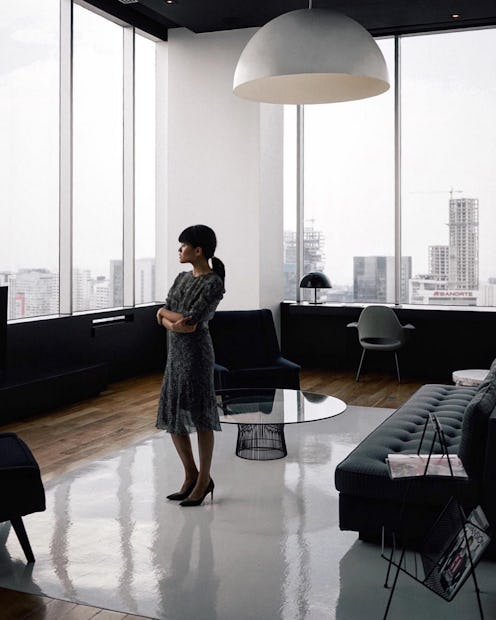Looking for a new place to live can be incredibly exciting and incredibly stressful. These days, it’s tough to be a renter in most cities, so it’s important to be thoughtful and thorough when hunting for your next abode. Here, 11 important considerations to make before signing that lease.
Some landlords require an annual income that's 40 times the rent they're asking per month. (We laughed out loud when we heard this—what is it, 2007? When people actually made money?!) This means that if your rent is $2,000 per month, you must make $80,000 per year to be approved. If you don't meet this requirement, you may want to consider seeking a co-signer, though it's important to keep in mind that your rent should ideally cost no more than one quarter of your gross monthly income (again, not very realistic these days).
Another reason to enlist the help of a co-signer is if you have poor credit. While most landlords don't prioritize credit scores when it comes to evaluating a tenant, it's possible that you might lose out to candidates with higher scores, in which case a co-signer can really help.
Many landlords will require that a co-signer make 80 times the monthly rent to be considered eligible to co-sign. Keep in mind that this person will be responsible for rent if you can't make the payment, so be wise about who you ask to fulfill this responsibility as well as mindful of how this arrangement might affect your relationship if you were to default.
Most landlords require that you pay the first month's rent plus a security deposit, which is usually equal to one month's rent, upfront. Some require first and last month's rent upfront plus a security deposit, or three months worth of rent. When looking for an apartment, consider your budget as it may affect whether or not you're even able to pay what the landlord is asking for in order to move in.
Make sure to clarify which utilities are included in your rent, and which will require an additional payment each month, before signing a lease. These expenses include trash, cable, WI-FI, electric, and gas. We also suggest trying to get estimates in advance, whether it be from a prior tenant, the landlord, or the utility company.
If you paint, hang things (and create holes in the wall), add wallpaper, or make other aesthetic adjustments to the apartment, will you need to return it to its original state before moving out? If not, what portion of your security deposit will be held as a penalty?
Before agreeing to sign a lease, you should be clear on who to call when your sink breaks, your hot water goes out, or any other type of maintenance-requiring event occurs. You should also make clear who pays for these repairs and under what circumstances; for example, if the landlord-designated serviceman is not available and you're having a plumbing emergency and need to call someone else, will your landlord cover that fee?
If you violate a lease agreement which specifically prohibits use of Airbnb, your landlord can evict you. Here is some advice for getting your landlord to approve Airbnb, as well as some information on why it is incredibly risky for them to do so.
True story: We once rented an apartment in Beverly Hills for a crazy low fee per month, only to realize after moving in that there were no laundry facilities anywhere on the property. This was a huge pain, so we suggest you double-check your laundry access before signing any lease. Other features to look for include a dishwasher, a microwave, and a garbage disposal.
If you have a pet, or want the option of adding a pet to your home, be sure to talk this through with your potential landlord before signing a lease. Any restrictions or fees should be clearly outlined in your lease.
If you live in a dense urban area with heavy street cleaning regulations, this is a big one. Be sure to assess the parking situation and, if you're stuck with street parking only, don't hesitate to ask other tenants for a realistic picture of how difficult it is to find a spot at all hours of the day and night. (Note: Street cleaning restrictions can add hundreds of dollars in parking tickets per year.) If you have an assigned spot, be sure to find out if it's a tandem situation, and if so we suggest you meet the person with whom you'll be sharing before signing a lease. If there are fees associated with wherever you've been assigned to park, ensure they're definitively outlined in your lease agreement.
This one is critical; you'll want to make sure you have a clear understanding of what you'll owe if you need to break your lease early, as you can be held responsible for the entire balance of the duration of your commitment. Here is more from The New York Times on what your options may be if you find yourself needing to move out before your lease has expired.
You'll want to consider factors like whether or not the apartment is in a noisy area, how much natural light it gets, how easy it is to get to in traffic, what type of floors it has and how difficult they are to maintain, and how safe the area is before committing to a lease. Though you may be in love with your new place at first sight, it's important to carefully consider all aspects of the apartment before you sign away the next year of your life away. As mentioned in slide #10, once you're in on a lease, buyer's remorse can be incredibly costly!
